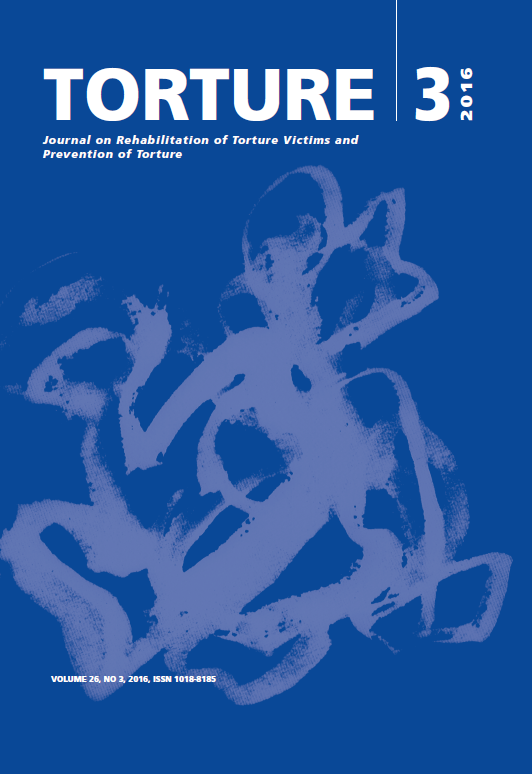Enhancing empathy among humanitarian workers through Project MIRACLE: Development and initial validation of the Helpful Responses to Refugees Questionnaire
DOI:
https://doi.org/10.7146/torture.v26i3.109383Keywords:
refugees, torture survivors, resettlement, motivational interviewing, empathy, Project MIRACLE, HRRQAbstract
Background: Empathy is an important tool needed for service providers working with people who have experienced trauma, such as refugees and torture survivors. However, the high caseloads, rigorous deadlines, and overwhelming circumstances under which humanitarian workers typically operate often make it challenging to employ empathy. The Helpful Responses to Refugees Questionnaire (HRRQ) was developed to measure empathetic responsiveness, a core skill of Motivational Interviewing, among service providers working with refugees, including torture survivors.
Methods: The HRRQ was adapted specifically for measuring empathy in refugee contexts, including among asylum-seekers and torture survivors. Face validity and content validity were established by a panel of refugee resettlement experts prior to administration. The instrument was then administered via an online survey to a national sample of refugee service providers
(valid N=90).
Findings: The HRRQ demonstrated good psychometric properties.
Interpretation: The HRRQ has several potential applications for work with refugees, including torture survivors. It could be used as a supervisory tool to assess service providers’ skills in this area and provide feedback for improvement if needed. It could also be used as a screening tool for hiring new staff as part of a comprehensive screening and selection process. Finally, it may be used as a pretest-posttest to evaluate the impact of staff training in motivational interviewing. Limitations of this study and implications for future research are discussed.
References
2. Baker R. Psychological consequences for tortured refugees seeking asylum and refugee status in Europe. In: Basoglu M., editor. Torture and Its Consequences, Current Treatment Approaches. Cambridge: Cambridge University Press 1992; 83-106.
3. UNHCR. Figures at a glance. Global Trends 2015. Statistic Yearbooks. [Internet]. 2016 [Cited 2016 Sep 25]. Available from http://www.unhcr. org/en-us/figures-at-a-glance.html.
4. Kirmayer LJ, Narasiah L, Munoz M, Rashid M, Ryder AG, Guzder J, Hassan G, Rousseau C, Pottie K. Common mental health problems in immigrants and refugees: General approach in primary care. CMAJ 2011; 183(12): E959–E967.
5. Wenzel T, Kastrup MC, Essenman D. Survivors of torture: A hidden population. In: Walker PF, Barnett ED, editors. Immigrant Medicine. Philadelphia: Saunders/Elsevier; 2007; 655-665.
6. Barker RL. The Social Work Dictionary (5th ed.). Washington, DC: NASW Press; 2003.
7. Laska KM, Gurman AS, Wampold, BE. Expanding the lens of evidence-based practice in psychotherapy: A common factors perspective. Psychotherapy 2014; 51: 467-481.
8. U.S. Department of State. Frequently Asked Questions (FAQ) on Refugee Resettlement Benefits. 2015. Available from: http://photos.state.gov/ libraries/iraq/216651/refugees/FAQ on refugee resettlement benefits.pdf
9. Miller WR, Rollnick S. Motivational Interviewing: Helping People Change. 3rd ed. New York: Guilford; 2012.
10. Rollnick S, Miller WR, Butler C. Motivational Interviewing in Health Care. New York: Guilford; 2008.
11. Arkowitz H, Westra HA, Miller WR, Rollnick S, editors. Motivational interviewing in the Treatment of Psychological Problems. New York: Guilford; 2007.
12. Hohman M, editor. Motivational Interviewing in Social Work Practice. New York: Guilford; 2011.
13. van der Veer G. Counselling and Therapy with Refugees and Victims of Trauma. 2nd ed. West Sussex, England: Wiley; 1998.
14. Sue DW, Sue D. Counseling the culturally diverse: Theory and practice. 7th ed. Hoboken, NJ: Wiley; 2016.
15. Potocky M. Motivational interviewing: A promising practice for refugee resettlement. J of Ethnic and Cultural Diversity in Social Work 2016; 25:247-252.
16. Miller WR, Hedrick KE, Orlofsky DR. The Helpful Responses Questionnaire: A procedure for measuring therapeutic empathy. J Clin Psychol 1991; 47:444-448.
17. Baer JS, Rosengren DB, Dunn CW, Wells EA, Ogle RL, Hartzler B. An evaluation of workshop training in motivational interviewing for addiction and mental health clinicians. Drug Alcohol Depend 2004;73:99-106.
18. Martino S, Haeseler F, Belitsky R, Pantalon M, Fortin AH. Teaching brief motivational interviewing to year three medical students. Med Educ 2007; 41: 160-167.
19. Miller WR, Yahne CE, Moyers TB, Martinez J, Pirritano M. A randomized trial of methods to help clinicians learn motivational interviewing. J Consult Clin Psychol 2004; 72: 1050-1062.
20. Shafer MS, Rhode R, Chong J. Using distance education to promote the transfer of motivational interviewing skills among behavioral health professionals. Journal of Subst Abuse Treat 2004; 26: 141-148.
21. Miller WR, Mount KA. A small study of training in motivational interviewing: Does one workshop change clinician and client behavior? Behavioural and Cognitive Psychotherapy 2001; 29:457- 471.
22. Walters ST, Alexander M, Vader AM. Officer Responses Questionnaire: A procedure for measuring reflective listening in probation and parole settings. Federal Probation 2008; 72: 67-70.
23. Haynes SN, Richard DCS, Kubany ES. Content validity in psychological assessment: A functional approach to concepts and methods. Psychological Assessment 1995; 7: 238-247.
24. Cohen J. Statistical Power Analysis for the Behavioral Sciences. 2nd ed. Hillsdale, NJ: Erlbaum; 1988.
25. Field A. Discovering Statistics Using IBM SPSS Statistics (4th ed). London: Sage; 2013.
26. Owen CL, English, M. Working together as culture brokers by building trusting alliances with bilingual and bicultural newcomer paraprofessionals. Child Welfare 2005; 84:669-688.
Downloads
Published
How to Cite
Issue
Section
License
We accept that some authors (e.g. government employees in some countries) are unable to transfer copyright. The Creative Commons Licence Attribution-NonCommercial-NoDerivatives 4.0 International (CC BY-NC-ND 4.0) covers both the Torture Journal and the IRCT web site. The publisher will not put any limitation on the personal freedom of the author to use material contained in the paper in other works which may be published, provided that acknowledgement is made to the original place of publication.


